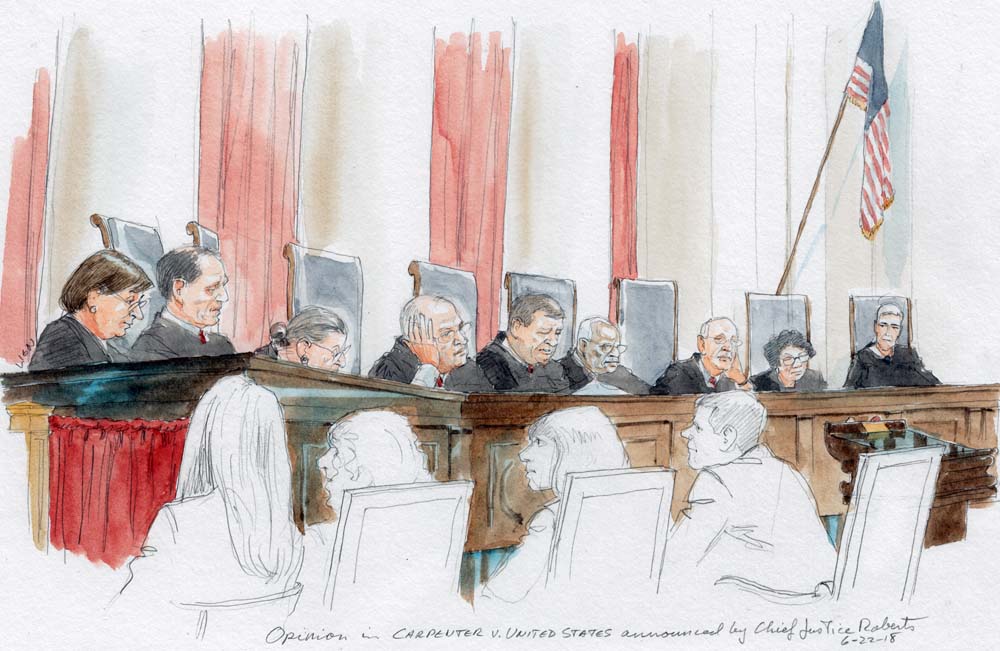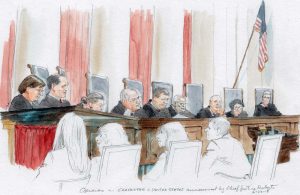A “view” from the courtroom: “Some good and hard thinking on all sides”


It’s a rainy day in Washington, and some people entering the courtroom have wet shoulders. This opinion day was added only yesterday, and the public gallery is not completely full. The bar section is even emptier than it was yesterday, with a few regulars in attendance again because they are awaiting one decision or another.
Solicitor General Noel Francisco leads the contingent from his office, joined by his deputies Edwin Kneedler and Malcolm Stewart, as well as a handful of others.
In the VIP box, Jane Roberts, the wife of Chief Justice John Roberts, is here today. Across the courtroom, in the press seating, this leads to speculation that a decision could be coming from the chief justice in Carpenter v. United States, about warrantless police searches of cell-site location information. The chief justice is the only member of the court who hasn’t written a majority opinion out of the December sitting. Reporters’ guesses are usually correct, as long as one ignores all the times that our speculation misses the mark.

The court takes the bench promptly at ten o’clock, and Roberts says that Justice Neil Gorsuch has the decision in Currier v. Virginia, an interesting case about double jeopardy.
Gorsuch launches into the story of petitioner Michael Currier, a Virginia man who was charged with various crimes connected to a safe full of guns that was dredged up from a river. The safe’s owner maintained that the safe had also contained $71,000 in cash, which was missing by the time it was found.
The defendant and the prosecution agreed to sever the various charges against Currier into two trials because the prosecution could introduce evidence of prior convictions to prove a felon-in-possession-of-a-firearm charge, which might prejudice the jury on the other charges.
Currier was acquitted in the first trial, involving burglary and larceny charges. He then sought to stop his second trial, arguing that it would be double jeopardy, or at least to exclude certain evidence from the first trial at the second.
Gorsuch delivers a fractured opinion that has a majority for the idea that because Currier consented to the second trial, his conviction on the felon-in-possession charge did not violate the double jeopardy clause.
The chief justice and Justices Clarence Thomas and Samuel Alito have joined in full, while Justice Anthony Kennedy has joined only Parts I and II and written a concurring opinion. Justice Ruth Bader Ginsburg has written a dissent, joined by Justices Stephen Breyer, Sonia Sotomayor and Elena Kagan.
Kagan is up next with Ortiz v. United States, involving a challenge to Airman First Class Keanu Ortiz’s criminal conviction for distributing pornography, when a judge on an U.S. Air Force appeals court also served on the Court of Military Commission Review, which reviews decisions from Guantanamo Bay. It is Kagan’s second opinion in a row implicating the appointments clause in Article II of the Constitution.
Kagan explains that in addition to the substantive issue — whether a statute or the appointments clause bars the judge’s simultaneous service on the two tribunals — there is an important jurisdictional issue. She points to the amicus brief filed by Professor Aditya Bamzai of the University of Virginia law school that questioned whether the Supreme Court had jurisdiction to review a decision of the U.S. Court of Appeals for the Armed Forces.
“We spend quite a lot of our opinion addressing that argument,” Kagan says from the bench, mentioning the Supreme Court’s 1803 decision in Marbury v. Madison.
“Maybe some of you remember Marbury,” she says, before giving a short history lesson. (Marbury came up quite a bit during oral argument in the case, and Steve Vladeck, who argued for Ortiz and other petitioners, will no doubt remember that Kennedy asked him whether he thought Marbury was right.)
I have my own memories of learning about Marbury in 8th grade social studies. I was the one who kept asking the teacher, Mrs. Froelich, whatever happened to William Marbury, and whether he ever got his commission as a justice of the peace. That was unimportant, she said, because it was the principle of the decision by Chief Justice John Marshall that mattered. Perhaps you should consider journalism if you are so interested in follow-up details, she advised.
Kagan goes on. “Now this case does not look much like Marbury,” she says, because Ortiz did not bypass lower courts as Marbury had. But she explores Bamzai’s arguments that military courts are different than Article III courts and the justices don’t have jurisdiction.
After explaining why the majority has rejected Bamzai’s arguments, she thanks him for his service as amicus.
“As I hope readers of today’s decision will agree when they read all the opinions in this case—including a concurrence and dissent, Professor Bamzai provoked some good and hard thinking on all sides,” Kagan says.
This brings us back to the substantive issue in the case, “which you’ve doubtless forgotten by now,” she says. Congress specifically authorized the kind of joint appointment on the Air Force appeals court and the military commission, and the appointments clause “doesn’t impose any rules against this kind of dual service.”
The decision below is affirmed, with Thomas filing a concurring opinion, and Alito filing a dissent that Gorsuch joined. Kagan then explains that two companion cases, Dalmazzi v. United States and Cox v. United States, are being dismissed as improvidently granted.
Thomas is up next with the opinion in WesternGeco LLC v. ION Geophysical Corp, a patent-infringement case.
In this dispute between two companies which offer systems used to survey the ocean floor, Thomas fairly quickly explains the case and concludes that WesternGeco’s jury award for lost foreign profits was a permissible domestic application of a provision of the Patent Act.
Gorsuch has filed a dissent, joined by Breyer.
Patent infringement is not something that Mrs. Froelich spent much time on in 8th grade social studies, unlike the double-jeopardy clause and Marbury, as well as the subject of the final decision this morning, the Fourth Amendment.
Indeed, the chief justice has the opinion in Carpenter. He opens by taking note of the wide use of cellphones.
“If you have a smartphone, it taps in” regularly to the nearest cellular tower, he says, when it is time- and location-stamped and collected into records known as cell-site location information, or CSLI.
He mentions “you” several times in his bench announcement, looking out to the audience in the courtroom and meaning, of course, all of us.
Roberts gives some of the details of the case involving petitioner Timothy Ivory Carpenter, whom authorities, using CSLI, connected to a series of robberies of Radio Shack and “ironically enough, T-Mobile stores.”
Prosecutors told the jury in Carpenter’s trial that the cell-location data placed the defendant “right where the … robbery was at the exact time of the robbery,” the chief justice related.
Roberts says “there is a world of difference” between the limited types of personal information that cellphone users give up on a given day and the exhaustive record of location information casually collected by wireless carriers.
Government cell-site monitors are “like an ankle monitor,” Roberts says, “allowing near perfect surveillance” at practically no expense.
He calls his opinion narrow and says the court is not limiting traditional investigative methods or implicating collection techniques involving foreign affairs or national security.
He quotes Justice Felix Frankfurter, from Northwest Airlines Inc. v. Minnesota in 1944, saying that the court, when considering new innovations in airplanes and radios, must tread carefully in such cases, “to ensure that we do not ’embarrass the future.'”
In closing, the chief justice reaches further back, to 1928 and Justice Louis Brandeis’ dissent in Olmstead v. United States, which said the court is obligated — as “subtler and more far-reaching means of invading privacy have become available to the Government” — to ensure that the “progress of science” does not erode Fourth Amendment protections.
“We decline to grant the state unrestricted access to a wireless carrier’s database of physical location information,” Roberts says. In light of the deeply revealing nature of CSLI, its depth, breadth, and comprehensive reach, and the inescapable and automatic nature of its collection, the fact that such information is gathered by a third party does not make it any less deserving of Fourth Amendment protection.”
“The government’s acquisition of the cell-site records here was a search under that amendment,” he concludes.
Kennedy has filed a dissenting opinion, joined by Thomas and Alito. Thomas has filed a dissenting opinion. Alito has filed a dissenting opinion, joined by Thomas. And Gorsuch has filed a dissenting opinion. Despite some strong views in those dissents, none of the four speaks from the bench.
With that, Marshal Pamela Talkin bangs her gavel and announces that the court will return on Monday at 10. She does not invoke the traditional second-to-last day observation that the court will finish all its business in argued cases on that next day for opinions.
That most likely means two more days of opinions. That leaves the weekend for the justices to continue their good and hard thinking about their work.
Posted in What's Happening Now
Cases: WesternGeco LLC v. ION Geophysical Corp., Cox v. United States, Currier v. Virginia, Ortiz v. United States, Carpenter v. United States, Dalmazzi v. United States
